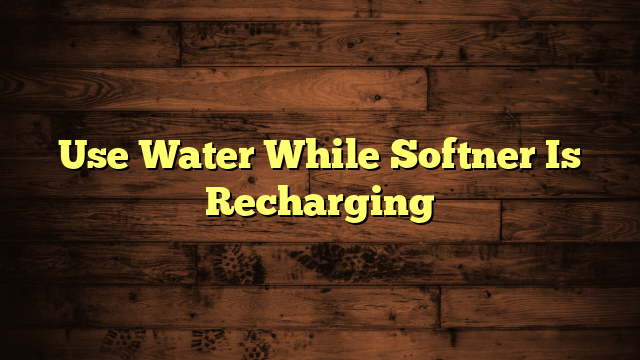How Much Should a Water Softner System Run?
Is it true that the ideal runtime for a water softener is purely based on water hardness and household size? While that might be a common assumption, there are several factors that can influence how often your system should regenerate. Understanding your daily water usage and the specific needs of your household can lead to more efficient operation. You may start to wonder if you're optimizing your water softener's performance or wasting resources, which raises questions about how to properly program and maintain the system for your unique situation.
Key Takeaways
- The run time of a water softener depends on household water usage and the hardness level of the water.
- Larger families or higher water consumption rates lead to more frequent softener cycles.
- Regular water testing helps determine the optimal settings and run time for your softener.
- Adjust the regeneration frequency based on changes in water usage and hardness levels.
- Monitor for signs of inefficiency, such as frequent regeneration or poor water quality, to optimize operation.
Understanding Water Hardness
When it comes to water hardness, knowing the specifics can make a big difference in how effectively your water softener operates. Water hardness is primarily determined by its mineral content, specifically calcium and magnesium ions.
These minerals can greatly impact your water quality, affecting everything from soap efficiency to the lifespan of your plumbing fixtures.
To understand how water hardness affects your home, consider testing your water. You can purchase a simple test kit or contact your local water supplier for detailed reports.
Hard water can lead to scale buildup in pipes, appliances, and fixtures, making them less efficient over time. By identifying the hardness level, you can tailor your water softener settings to better address your specific needs.
It's crucial to recognize that not all homes have the same water quality. For example, if you live in an area with naturally hard water, you might need a more robust softening solution.
In contrast, softer water may require less frequent regeneration. Understanding these nuances helps guarantee that your water softener runs efficiently, providing you with the best water quality possible for your daily activities.
Factors Affecting Run Time
When it comes to how long your water softener should run, several factors come into play.
Your water hardness levels, household water usage, and system efficiency rating all greatly influence the run time.
Understanding these elements can help you optimize your water softener's performance and guarantee it meets your household needs effectively.
Water Hardness Levels
Water hardness levels play an essential role in determining how often your water softener runs. When you understand the hardness of your water, you can better manage your softening system's efficiency.
To assess your water's hardness, consider conducting water testing. This process helps you determine where your water falls on the hardness scale, which ranges from soft (0-60 mg/L) to very hard (greater than 180 mg/L).
If your water is exceptionally hard, your softener will need to regenerate more frequently to remove excess minerals like calcium and magnesium. Conversely, if your water is softer, the system can run less often, saving you time and money.
Regularly testing your water not only provides insights into your hardness levels but also helps you catch any changes over time. As your water source or usage patterns shift, these adjustments could impact your softener's run time.
Understanding these factors empowers you to maintain your water softening system effectively, ensuring you enjoy the benefits of soft water while optimizing its performance.
Household Water Usage
Your household water usage greatly impacts how often your water softener runs. If you have a large family or frequently host guests, your daily water consumption will be higher, causing your softener to cycle more often. Understanding your usage patterns is essential for effective water conservation.
For instance, regular activities like showering, washing dishes, and doing laundry can considerably influence how much softened water you need.
You should also consider peak usage times. If everyone in your home showers in the morning, your water softener may need to work harder during that time. By being mindful of your routines, you can adjust your water habits to minimize waste.
For example, staggering showers and running appliances at different times can help reduce overall demand.
Additionally, if you're dedicated to water conservation, consider implementing low-flow fixtures and appliances designed to use less water. This can't only lower your water bill but also decrease the frequency with which your softener needs to regenerate.
Ultimately, keeping an eye on your household water usage and making conscious adjustments can lead to a more efficient and cost-effective water softening experience.
System Efficiency Rating
A water softener's efficiency rating considerably influences how often it runs. When you're considering a new system or evaluating your current one, understanding this rating can help you gauge system performance and how it affects your water usage and costs. Higher efficiency ratings mean your system can soften more water with less salt and energy, reducing run time.
Here's a quick efficiency comparison table to help you see how different ratings stack up:
| Efficiency Rating | Gallons per Cycle | Cost per Cycle |
|---|---|---|
| 100% | 1,000 | $1.00 |
| 90% | 900 | $1.10 |
| 80% | 800 | $1.25 |
| 70% | 700 | $1.40 |
| 60% | 600 | $1.60 |
As you analyze your options, remember that a more efficient system can save you money in the long run. So, keep an eye on that efficiency rating—it can considerably affect how often your water softener runs and how much you spend on maintenance and utilities.
Household Size Considerations
Considering household size is vital when determining how much a water softener should run. Your family size directly impacts your water needs, which in turn influences the efficiency of your water softener system.
For instance, a larger family will generally require more water for daily activities like bathing, cooking, and laundry. This increased demand means your water softener must work harder to keep up with the softened water supply.
If you live alone or with just one other person, your water needs will naturally be less, allowing the softener to run less frequently. However, as your family grows or if you have frequent guests, you may need to adjust the settings or capacity of your system to guarantee it meets your household's demands.
It's important to evaluate your family's habits and routines. Do you take long showers, or do you have a dishwasher that runs daily?
Understanding these factors helps you customize your water softener's operation effectively. By considering your household size and water usage patterns, you can optimize your system, making sure you have the soft water you need without wasting energy or resources.
Average Water Usage
When it comes to determining how much a water softener should run, understanding average water usage is essential. Your household's average daily consumption directly affects how often your system will need to regenerate. By analyzing your water usage patterns, you can optimize your softener's performance.
Here are some factors to evaluate regarding your average water usage:
- Daily consumption: The average household uses about 80-100 gallons of water per person daily.
- Appliance usage: Dishwashers and washing machines can greatly impact your total water consumption.
- Seasonal variations: Your water usage may increase during summer months due to gardening or pool maintenance.
- Lifestyle factors: Families with young children or frequent guests will likely use more water.
- Water-saving fixtures: Installing low-flow showerheads and faucets can reduce overall consumption.
Softener System Types
Understanding the different types of water softener systems available can help you choose the right one for your home. Each system has its strengths and weaknesses, so knowing your options is essential.
| System Type | Pros | Cons |
|---|---|---|
| Salt Based Systems | Effective at hard water removal | Requires regular salt refills |
| Magnetic Softeners | No salt needed, eco-friendly | Less effective on severe hardness |
| Dual Tank Systems | Continuous soft water supply | More expensive and complex |
| Reverse Osmosis | Purifies water, removes contaminants | Slower water production |
Salt based systems are common and highly effective at softening water. Magnetic softeners are a newer, eco-friendly option that doesn't require salt but may not handle extreme hardness well. Dual tank systems offer continuous soft water, making them perfect for larger households, but they can be pricier. Finally, reverse osmosis systems not only soften water but also purify it, ensuring you have clean drinking water.
Programming Your Water Softener
Programming your water softener is essential for optimizing its performance and guaranteeing you get the best results. To properly set your softener settings, follow these programming guidelines that help you tailor the system to your household's needs.
- Know your water hardness: Test your water to determine the hardness level, which influences your settings.
- Set the regeneration frequency: Adjust how often your softener regenerates based on your water usage and hardness.
- Adjust the salt dosage: Ascertain the system uses the correct amount of salt for efficient operation.
- Program the time of day for regeneration: Schedule this process during off-peak hours to save on utility costs and reduce disruption.
- Monitor your water usage: Keep track of how much water your household consumes to make necessary adjustments to your settings.
Signs of Inefficiency
You might notice some signs that your water softener isn't working as it should.
High energy bills, scale buildup on your fixtures, and an unpleasant taste in your water can all indicate inefficiency.
Recognizing these issues early can save you both money and frustration down the line.
High Energy Bills
When your water softener runs inefficiently, it can lead to unexpectedly high energy bills. Excessive energy consumption not only impacts your wallet but also hints at underlying issues with the system.
To identify whether your water softener is draining your finances, watch for these signs:
- Frequent regeneration cycles
- Unusual noises during operation
- Higher-than-usual electricity bills
- Poor water quality despite treatment
- Increased wear on plumbing fixtures
These indicators suggest that your water softener may not be functioning effectively, leading to increased energy consumption and reduced cost savings.
If you notice any of these signs, it's time to assess your system. Regular maintenance can improve efficiency, helping you save both energy and money in the long run.
Scale Buildup Issues
Scale buildup can greatly impact the efficiency of your water softener and your home's plumbing system.
If you've noticed reduced water flow, frequent clogs, or white, chalky residue on faucets and fixtures, these might be signs of scale accumulation. This not only affects your appliances but can also lead to higher energy bills as your system works harder to compensate for the inefficiencies.
To combat scale issues, employing effective scale prevention methods is vital.
Regular maintenance, such as checking salt levels and verifying proper settings, can help keep your softener running at peak performance. Furthermore, using a pre-filter can catch impurities before they enter your system, reducing the likelihood of scale formation.
If scale has already built up, you'll need to implement scale removal techniques.
Descaling solutions or vinegar can be effective for minor issues, while more severe cases may require professional intervention. By staying proactive and addressing these issues promptly, you'll maintain your water softener's efficiency and prolong the lifespan of your plumbing system.
Don't wait until problems escalate; take action now to guarantee a smooth-running home.
Unpleasant Water Taste
An unpleasant water taste can be a clear sign that your water softener isn't functioning efficiently. When you notice an unpleasant aftertaste or even a metallic flavor in your water, it's essential to investigate the root cause. This issue can stem from several factors that affect the quality of your water supply.
Here are some signs that your water softener might need attention:
- Unpleasant aftertaste: A lingering taste that makes water less enjoyable.
- Metallic flavor: This can indicate corrosion in your plumbing or mineral buildup.
- Cloudy appearance: A sign of particles or contaminants in your water.
- Frequent maintenance alerts: If you're constantly adjusting settings, something's off.
- Increased sodium levels: This can lead to health concerns and taste issues.
If you're experiencing any of these symptoms, it might be time to check your water softener.
Regular maintenance and timely repairs can help restore the quality of your water, ensuring it tastes fresh and clean.
Regular Maintenance Tips
To keep your water softener running efficiently, regular maintenance is imperative. First, establish a maintenance schedule that suits your system's needs. Typically, you should check your softener every few months. This includes inspecting the salt levels and verifying they're adequate for ideal performance. If you notice the salt level dropping considerably, it's time to refill.
Another important aspect is filter replacement. Depending on your water quality, you might need to change your filters every six months to a year. A clogged filter can reduce the system's efficiency and lead to unpleasant water taste or even damage the unit. Remember to consult your manufacturer's guidelines for specific recommendations on filter types and replacement intervals.
Additionally, periodically cleaning the brine tank is essential to prevent buildup. This simple task helps maintain your water softener's efficiency.
Finally, don't forget to test your water hardness regularly. By following these maintenance tips, you can guarantee a longer lifespan for your water softener and enjoy soft, pleasant-tasting water every day. Keeping up with these tasks will save you money and headaches in the long run.
Frequently Asked Questions
How Do I Know if My Softener Needs a Recharge?
To know if your softener needs a recharge, check the recharge indicators. If they're lit or you're noticing hard water signs, it's time for some softener maintenance to guarantee peak performance and longevity.
Can Water Temperature Affect Softener Performance?
Water temperature influences softener efficiency; warmer water enhances ion exchange, while colder water may slow the process. If you adjust your system for ideal temperature, you'll maximize its performance and maintain softened water quality.
What Is the Lifespan of a Water Softener?
A water softener typically lasts 10 to 15 years with proper maintenance. Regular checks and timely water softener replacement guarantee peak performance, helping you avoid issues like scale buildup and reduced efficiency in your home's plumbing system.
Are There Specific Brands Known for Efficiency?
Picture a gleaming kitchen, where brand comparisons reveal the best choices. When you check efficiency ratings, brands like Culligan and Fleck shine bright, ensuring your water softener runs smoothly, saving you both time and money.
How Do I Troubleshoot a Malfunctioning Softener?
To troubleshoot a malfunctioning softener, start with basic softener maintenance. Check for blockages, inspect the salt level, and clean the resin bed. Use these troubleshooting tips to identify issues and restore peak performance.
Conclusion
In summary, understanding your water softener's run time is essential for ideal performance. By considering factors like water hardness, household size, and daily usage, you can fine-tune the system for efficiency. Notably, even small changes in your water habits can lead to significant differences in softener frequency. Regular maintenance and testing will keep your system running smoothly, ensuring you enjoy soft water without unnecessary salt use or costs. Stay proactive, and your water softener will serve you well for years.







